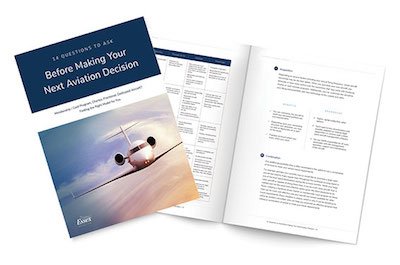
Those new to the world of private aviation may notice that the term “broker” comes up fairly frequently and can be used to describe various roles. In the most general terms, a broker refers to any person or firm that facilitates transactions between two parties. Though this definition is still broadly true for the private aviation industry, there are multiple types of private jet brokers who offer distinct areas of expertise and fill different roles depending on the particulars of the situation.
In short, the term “broker” can have multiple meanings within the private aviation industry. Therefore, it’s important to understand the distinction between these different types of brokers to ensure that you identify a candidate with the experience, reputation and specialized skills you need.
In this article, we’ll offer insight into the various types of private jet brokers, how to identify which type of broker you might need and what skillset to look for when choosing a broker. We’ll also explain when and why it might make sense to retain the services of a professional private aviation consultant rather than — or perhaps in addition to — a traditional broker.
Private Jet Brokers: A Bit of Context
There are technically four types of brokers common to the private aviation industry. The first of these specializes in the handling and regulatory matters specific to international transactions that involve importing private aircraft and/or large aircraft components and equipment into the United States.
Since the role of this first type of broker is specific and unique, we will not cover this role in detail. However, know that there are situations involving international transactions where you might need to call upon such a broker to provide specialized services.
Charter Brokers, Aircraft Brokers & Buyer Brokers: What’s the Difference?
Beyond brokers who specialize in international transactions, there are three main categories of private jet broker; they are as follows:
Charter Brokers
The term “charter broker” is used to refer to either an individual or firm responsible for arranging charter flights with an appropriate aircraft operator based on their client’s travel needs, which can include their price point, preferred aircraft model and any additional preferences.
In many cases, the charter broker is neither the owner nor operator of the aircraft. In the private aviation industry, the term “operator” describes any individual or company that has received FAR Part 135 certification from the Federal Aviation Administration (FAA) to operate aircraft ultimately used for public charter. It is common for operators to make their aircraft available for charter through arrangements with multiple charter brokers.
Aircraft Brokers
The term “aircraft broker” refers to an individual or firm that represents an owner’s best interest in the sale process of their aircraft. Since aircraft brokers help facilitate aircraft marketing and transactions, they require a very different skill set and usually have different industry relationships than a charter broker.
Aircraft brokers are expected to advertise aircraft on their clients’ behalf and identify and qualify prospective buyers, all in the interest of ensuring that their client, the seller, extracts the greatest monetary value from the transaction. Depending on the aircraft and current market conditions, aircraft brokers must be prepared to field inquiries from anywhere in the world, at any time of day or night.
Besides identifying the best buyer, qualified aircraft brokers are also expected to represent their client throughout the sale process, avoiding complications and minimizing risk along the way. In most cases, individual aircraft brokers belong to a larger group or firm that provides added experience and resources; depending on their reputation, these firms are often able to obtain exclusive aircraft listings.
An aircraft broker’s primary objective is to make the transaction process as fast, smooth and efficient as possible; this not only ensures a positive experience and outcome for the client, but also enables the broker to move on to the next transaction as quickly as possible. Truly successful aircraft brokers tend to generate repeat business from the same clients. This arrangement benefits both the client and the broker because the client gets to work with an experienced and reliable partner, and the broker is intimately familiar with the aircraft and its history when selling to the next owner.
Buyer Brokers
A “buyer broker” is an individual or firm responsible for representing a buyer during a transaction and advocating for their best interest — essentially, the inverse of an aircraft broker. Buyer brokers are more commonly known as “buyer representatives.”
Buyer brokers, or representatives, are often engaged to oversee the technical aspects of a pre-purchase inspection or any major milestone inspection that may coincide with the transaction process timeline. In some instances, a buyer broker will take on additional responsibilities, acting as an advocate for their client throughout the transaction process; as a result, the list of services buyer representatives provide can vary depending on the particulars of the situation.
Private Jet Brokers vs. Private Aviation Consultants
Individuals interested in purchasing a private aircraft may also find value in working with a private aviation consultant. Private aviation consultants are distinct from private jet brokers in that they usually offer a broader range of services. In addition to representing a client’s interests during the transaction process, private aviation consultants will also:
- Provide detailed analysis and budgeting to help the client identify the most appropriate aircraft model based on their travel needs
- Negotiate the terms of a purchase agreement and manage critical details
- Manage the due diligence process throughout a pre-purchase inspection
- Help the client determine where the aircraft will be based, how it will be maintained and how it will be operated
In many instances, qualified private aviation consultants will stay on with a client well after closing and assist them with processes such as obtaining preferred N-numbers, overseeing refurbishments that need to be made to the aircraft and help them either select a management company or set up their own flight department.
A final but critical note: A qualified private aviation consultant should operate independently — that is, their advice and recommendations should not be biased toward any service provider, supplier or aircraft manufacturer.
Choosing a Private Jet Broker
As you can see, charter brokers, aircraft brokers and buyer brokers — and aircraft acquisition consultants — take on different roles and serve different needs. To determine which type of private jet broker is right for you, you must first consider what services you require and what you aim to achieve.
The best place to start is by defining your travel requirements. For example, do you intend to use private aircraft for business purposes, personal use or a combination of the two? How often do you anticipate flying — a few hours each month, or several hours each week? Do you intend to fly with large groups of people on a regular basis? These questions will help you determine what your needs are, which can help you zero in on the type of aircraft you require — and even which broker is right for the job.
Let’s review what qualities, capabilities and expertise to look for in a charter broker, an aircraft broker and a buyer broker.
Charter Brokers
The private aircraft charter business has evolved from one in which clients had a direct relationship with their charter broker to one in which clients are able to arrange their charter online — with or without the assistance of a broker.
Though less common these days, you still have the option to work with a charter broker directly and have them arrange travel on your behalf. In fact, if you need to charter aircraft on a frequent basis, regularly fly to international destinations or your travel requirements are complex, having a close relationship with your charter broker — particularly one that’s associated with a large aircraft charter supplier — can be beneficial.
In general, larger aircraft brokerage firms are a smart choice for international travel because they can offer contingency planning, 24/7 service and the ability to source a replacement aircraft in a timely manner should you encounter any issues. They also typically have access to a larger selection of available aircraft makes and models and should have established relationships with international providers.
If, however, you have infrequent charter needs or tend to fly within a specific geographical region, you might prefer to work directly with a local Part 135 operator. A qualified operator can typically provide greater crew and aircraft consistency within a specific region than a larger charter broker in a different region.
Looking for a qualified aircraft broker?
Ask the following…
- How long have you been in business?
- Do you have existing clients with needs similar to mine?
- What operators do you primarily use for providing charter aircraft?
- What safety assurance standards do you require from aircraft operators that you use as charter vendors?
- How do you handle funds paid in advance of a flight?
- How do you handle backup aircraft support in the event of a trip interruption?
- How do you intend to reimburse me in the event that my trip is partially or completely canceled?
- Do you have any recent client references I could speak to?
When evaluating charter brokers, it’s important to keep in mind that only a small segment of all brokers has exclusive or direct access to aircraft; as a result, most charter brokers are pulling from the same pool of FAA Part 135-certified operators and aircraft as their competitors.
Even if you choose to work with a charter broker, it may be to your benefit to confer with a private aviation consultant to ensure that the operator your broker sources aircraft from meets or exceeds FAA standards and meets all necessary qualifications. Additionally, a private aviation consultant can offer independent analysis and advice to help you determine whether chartering is, in fact, your best option based on your stated requirements.
Aircraft Brokers
As noted, the traditional role of an aircraft broker is to sell an aircraft on behalf of a client. As such, aircraft brokers are responsible for:
- Initiating conversations with prospective buyers
- Providing a basic listing sheet with current, professional photos and specifications
- Fielding inquiries about an aircraft’s asking price and damage history (if any)
- Supplying maintenance data in an electronic format
If a prospective buyer expresses interest in their client’s aircraft, the broker would then meet with the buyer’s team and conduct a preliminary visual review of the aircraft and its records. If all goes according to plan, the broker should be able to secure a Letter of Intent and, subsequently, an Aircraft Purchase Agreement. Although all aircraft brokers are responsible for representing their clients’ best interests, truly experienced brokers are able to keep the sales process moving at a steady pace while navigating the various obstacles that can arise when selling pre-owned aircraft.
Looking for a qualified aircraft broker?
Ask the following…
- Do you have prior experience supporting clients in the sale of this particular aircraft make or model?
- What is your strategy for marketing an aircraft of my make and model?
- How long have you been selling aircraft?
- What should I expect if we come to a broker agreement?
- Do you have any recent client references I could speak to?
- Would you be open to an interview
Private Jet Broker Cost Structures
Another key consideration when deliberating which private jet broker to work with — or whether to work with one at all — is cost. At a high level, brokers generally structure their costs as follows:
- Charter Brokers: Most charter brokers’ compensation is derived from (or based on) a predetermined percentage of a flight hour rate, which the charter aircraft would generate as revenue.
In some instances, charter brokers are able to add to their compensation by filling one-way or “deadhead” flights. It is not unusual for larger charter brokers to have relationships with fractional aircraft providers, jet card providers and other larger charter management companies. If you happen to have fractional ownership of an aircraft or use a jet card, your provider likely uses its charter broker relationship to support your travel.
- Aircraft Brokers: Aircraft brokers typically prearrange compensation for services with an aircraft owner before their aircraft is listed for sale, either in the form of a negotiated flat fee or a percentage of the aircraft’s actual sale price.
- Buyer Brokers: Buyer brokers generally derive compensation from a flat fee or an hourly fee arrangement. In some cases, when agreed upon with the buyer, a buyer broker can derive compensation from a percentage of cost savings traceable to — for example — sourcing lower cost parts or invoice concessions extracted from technical services performed by the service provider
As a final note, rather than accept any industry incentive arrangements or commissions that could pose or even imply a conflict of interest, a private aviation consultant should confirm they are compensated exclusively by their clients.
Making the Case for a Private Aviation Consultant
By this stage, you may have noticed that there are certain gray areas — particularly during a transaction — in which a buyer can find themselves without suitable representation and, therefore, in a vulnerable position.
Without a doubt, the role of a broker is to complete a deal in a timely and efficient manner and to do so fairly; many brokers go a step further to ensure that both buyer and seller are pleased with the outcome. With that said, there are aspects to acquiring an aircraft that brokers do not explore, such as proactively looking for issues that could prove problematic for a new owner when they eventually wish to sell the aircraft, or other shortcomings that only a motivated buyer’s advocate will seek out and confirm. After all, acquiring an aircraft is an expensive and sophisticated process.
It is the responsibility of a private aviation consultant to consider these fine details during the aircraft selection process, as well as to manage the many necessary post-closing tasks — something neither buyer nor aircraft brokers are equipped or qualified to do.
In order to fully appreciate the value a private aviation consultant can deliver, it’s important to understand the full range of services they offer. For any buyer who wants to purchase a pre-owned aircraft, a private aviation consultant can:
- Provide in-depth analysis to help the buyer understand and select their preferred model(s) of aircraft
- Deliver an unbiased review of all available models, both on and off the market
- Conduct an on-site technical review prior to pre-purchase evaluation
- Manage a pre-purchase inspection, customizing it to capture any areas of high concern
- If necessary, provide substantiated cause to reject a candidate aircraft
- Participate in final aircraft review and test flights
- Work closely with a flight department or management company to enter the aircraft into service
- Negotiate and contain costs at all opportunities
- Provide value-added support should the buyer choose to make certain upgrades
- Manage refurbishment work on the aircraft post-closing
And for any buyer who wants to acquire a new aircraft, a private aviation consultant can:
- Attend aircraft design meetings and oversee the specification process
- Provide production and completion management or oversee the process
- Present financing or leasing options and coordinate introductions to industry lenders
- Assist in the selection process for a management company
- Assist in flight crew hiring, training and insurance coverage
- Manage the final inspection, acceptance, delivery and close of the aircraft to ensure its smooth entry into service
- Provide ongoing support as needed
In either the case of a new or pre-owned aircraft, you can retain the services of a private aviation consultant to review operating cost statements and act as an independent third-party resource when negotiating to get the greatest value from your management company.
Closing Recommendations
Before partnering with any private jet broker, it’s always in your best interest to check their references, even if everything else meets your requirements. The private aviation industry is relatively small, so it’s easy to confirm a broker’s reputation in a short amount of time.
Given the size of the investment required for aircraft chartering and — even more so — aircraft acquisition, you’ll also want to consider the quality of the referral and its source. For example, a referral from a well-known industry professional should carry more weight than one from a friend who has limited experience and knowledge of the private aviation industry.
Be sure to take as much time as you need and to talk to as many people as possible to develop an informed opinion. It’s always a positive sign if a broker is willing to meet with you to discuss their qualifications and answer any questions you might have — and certainly a red flag if they can’t make themselves available.
Essex Aviation: A Full-Service Consultancy
If you have any interest in learning more about the benefits of working with a consultant or the services a private aviation consulting firm can provide, you’ve come to the right place. Essex Aviation is a full-service consultancy that helps match clients with the right charter or ownership program based on their particular travel needs. Recognized within our industry for our honesty and integrity, unbiased approach and decades of experience, we’re dedicated to delivering an unparalleled level of expertise and advocating for our clients’ best interests.
Schedule a free consultation today or contact us directly to talk to one of our consultants.







